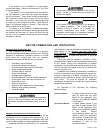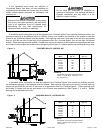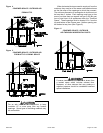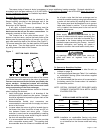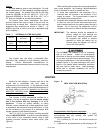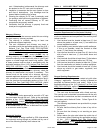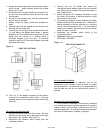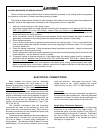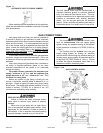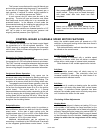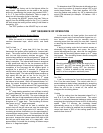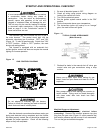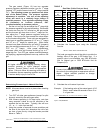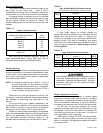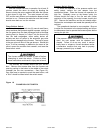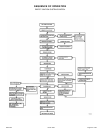
Figure 11
AUTOMATIC HEAT STAGING JUMPER
When installing optional accessories to this appliance,
follow the manufacturer's installation instructions included
with the accessory.
The unit cabinet must have an uninterrupted or
unbroken electrical ground to minimize personal
injury if an electrical fault should occur. This may
consist of electrical wire or approved conduit when
installed in accordance with existing electrical
codes. Do not use gas piping as an electrical
ground. Failure to follow this warning can result in
an electrical shock, fire, bodily harm, or loss of life.
GAS CONNECTIONS
Gas piping shall be of such size and so installed as
to provide a supply of gas sufficient to meet maximum
demands without undue loss of pressure between the gas
meter and the furnace. It is recommended that the gas
line to the furnace shall be a separate line direct from the
meter, unless the existing gas line is of ample capacity.
Refer to gas pipe capacity table in the National Fuel Gas
Code ANSI Z223.1/NFPA54, and/or CSA B149.1 Natural
Gas and Propane Installation Codes.
If local codes allow the use of a flexible gas appliance
connector, always use a new listed connector. Do no use
a connector which has previously serviced another gas
appliance.
Use a joint compound (pipe dope) that is resistant to
the action of liquefied petroleum gases or any other
chemical constituents of the gases to be conducted
through the piping.
For proper furnace operation the maximum gas
supply pressure is 14" w.c. and the minimum gas
supply pressure is 4.5" w.c. - Natural (11" w.c. - LP)
as shown on rating label.
Before any system of gas piping is finally put into
service, it should be carefully tested to determine if it is
gas tight. Check all piping for leaks using soapy water
and a brush. The piping must stand a pressure of six (6)
inches of mercury (3 PSIG) for a period of ten (10)
minutes or as required by local authority.
FIRE OR EXPLOSION HAZARD
Failure to follow the safety warnings exactly
could result in serious injury, death or property
damage.
Never test for gas leaks with an open flame.
Use a commercially available soap solution made
specifically for the detection of leaks to check all
connections. A fire or explosion may result causing
property damage, personal injury or loss of life.
The furnace and its individual shutoff valve
must be disconnected from the supply piping
system during any pressure testing of that system
at test pressures in excess of 1/2 PSIG (3.5kPa or
14"w.c.).
The furnace must be isolated from the gas
supply piping system by closing its individual
manual shutoff valve during any pressure testing of
the gas supply piping system at pressures equal to
or less than 1/2 PSIG (3.5kPa or 14"w.c.). Failure
to follow the above procedures could lead to a
hazardous condition and bodily harm.
Figure 12-A
GAS CONTROL PIPING
Figure 12-B
TYPICAL GAS SERVICE CONNECTION
20571201 Issue 0527 Page 16 of 28



